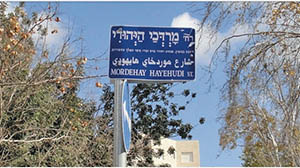

Today, as I celebrate my second Purim as a citizen of the State of Israel, I look back on the past year and I can conclude that, on a personal level, it has been a very successful one. I recall writing months ago that I believed there were a few basic strategies that could ease the klita, the absorption into a new country. I think that I have applied these strategies successfully, and, indeed, I came to the realization this week that I have become attuned to life here in Israel.
It was just this week when I realized that I can live opposite the cross street of Mordechai HaYehudi and Esther HaMalka and walk by them each day (including Purim) without stopping in amazement to stare at the street signs (that are, by the way, spelled differently on the opposite sides of the street). This week I also grasped the fact that I am used to seeing children and adults walking in the streets and traveling on public transportation dressed in all types of outlandish costumes. Neither I, nor other onlookers, even raised a curious eye.
I have also adjusted to other parts of Israel such as parking at metered parking without paying the meter, simply by using my phone app, Pango. I have become accustomed to making left turns only at left turn signals and keeping an eye out for pedestrians at crosswalks. I’ve gotten used to entering the bus through the rear door and paying my fare without having to bother the driver.
I have gotten used to emptying my pockets before entering the mall and I’m no longer surprised when I watch a sanitation driver jump off his truck on Sukkot morning in order to make a blessing over a lulav and etrog. I have memorized my teudat zehut (ID number) and I’m used to being asked for it at most transactions.
I have learned to expect more congregants bearing arms than wearing ties in shul on Shabbat and I’ve also learned not to expect mail to arrive on time. I have adjusted to hearing horns blaring behind me if I fail to start driving even before the light turns green and to having motorcyclists cut in front of the long line of cars to cross the light before everyone else. After some time, I also realized that purchasing 2K (kilograms) of cookies will yield me far more than I need and driving a consistent 55 kph (kilometers per hour) will find me left behind, crawling in the right lane.
Yes. I have adjusted. I’ve become accustomed to this place.
But, I admit, there are some things to which I have yet to adjust. And they are quite challenging.
I have not become accustomed to being the world’s scapegoat. I’m tired of having my country blamed for every world problem from terrorism to climate change.
I have not adjusted to being boycotted, sanctioned and divested from.
I have not accepted that the UN Human Rights Council will ignore the massacre in Syria, the terrorism in Belgium and the public executions of political prisoners in Iran in order to attack the only democracy in the Middle East by drawing up a list of all Israeli and international firms operating directly or indirectly in Judea/Samaria, East Jerusalem and the Golan Heights.
I have not acclimated myself to the daily reports of the victims of terrorist stabbing attacks.
I have not adjusted to the acceptance of horrific anti-Semitism growing on college campuses as a “legitimate form” of anti-Zionism.
So perhaps my adjustment has not been complete.
Or perhaps, these are things I never want to adjust to.
By Rabbi Neil Winkler
Rabbi Neil Winkler, founding rabbi of the Young Israel of Fort Lee, is a musmach of R.I.E.T.S. and a graduate of Yeshiva College and Bernard Revel Graduate School. He served the Fort Lee, NJ community for 36 years and taught Jewish Studies in the Moriah School of Englewood as Coordinator of Tanach studies. Rabbi Winkler is the author of Bringing the Prophets to Life, an overview of the Early Prophets. Rabbi Winkler currently lives in Jerusalem.











